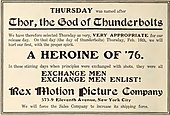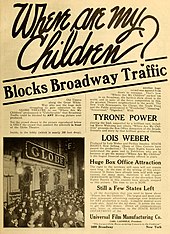Lois Weber
[1][2] Film historian Anthony Slide has also asserted, "Along with D. W. Griffith, Weber was the American cinema's first genuine auteur, a filmmaker involved in all aspects of production and one who utilized the motion picture to put across her own ideas and philosophies".[3] Weber produced a body of work which has been compared to Griffith's in both quantity and quality[4] and brought to the screen her concerns for humanity and social justice in an estimated 200 to 400 films,[1][5] of which as few as twenty have been preserved.For the next five years, they worked and were credited as The Smalleys (but typically Weber received sole writing credit) on dozens of shorts and features for small production companies like Gaumont, the New York Motion Picture Co., Reliance Studio, the Rex Motion Picture Company, and Bosworth,[15][77] where Weber wrote scenarios and subtitles, acted, directed, designed sets and costumes, edited films, and even developed negatives.[92] In 1913, Weber and Smalley collaborated in directing a ten-minute thriller, Suspense, based on the play Au Telephone by André de Lorde, which had been filmed in 1908 as Heard over the 'Phone by Edwin S.[113] A "prominent rabbi in Chicago strongly objected on the grounds that the play 'more than any other book, more than any other influence in the history of the world, is responsible for the world-wide prejudice against the Jews'",[114] but the film was praised at the time as "a supreme adaptation of Shakespeare".In this film, Weber plays "The Spider", a vamp living the "ultra-modern high life" who seduces and ruins intellectual men until frightened into adopting an orphan baby, which results in the salvation of the lead character through motherhood.[120] "Energized by evangelistic zeal and social conscience",[121] from early in her career Weber saw movies as "a vehicle for evangelism",[72] and "an opportunity to preach to the masses",[122] and to encourage her audience to be involved in progressive causes.[127] In 1914, Weber made her first major feature,[117] a controversial version of Hypocrites, a four-reel allegorical drama shot at Universal City[120] which she wrote, directed and produced, addressing social themes and moral lessons considered daring for the time.[131][132][133][134] Although the nudity was tastefully done[135] (it was passed by the National Board of Review of Motion Pictures after a two-month delay),[136] it was still banned in Ohio; caused riots in New York; and James Michael Curley, the mayor of Boston,[137] demanded that every frame displaying the naked figure of Truth be hand-painted to clothe the then unidentified actress.(1916),[74] influenced by the trial of Charles Stielow, an innocent man who was almost executed, opposition to capital punishment based on circumstantial evidence in The People vs. John Doe;[152] and alcoholism and opium addiction in Hop, the Devil's Brew, which were all successful at the box office,[144] but, while embraced by reformers in the film industry, "drew the ire of the conservatives".in some locations helped fuel the box office success of the film, estimated to have grossed in excess of $3 million,[157] in an era where ticket prices were less than 50c each,[13] and "rocketed Weber's name to larger audiences, bigger box-office returns, and an even higher annual income".[160] Shoes, a "sociological" film released in June 1916 that Weber directed for the Bluebird Photoplays, was based on Stella Wynne Herron's short story of the same name, which had been published in Collier's magazine earlier that year.Sensitive to the opinions of local communities, and hoping to avoid powerful censorship boards in the northeast and midwest, The Hand That Rocks the Cradle was distributed primarily in the southern and western regions of the United States, with the result that it did not attain the record-breaking attendance set by Where Are My Children?[167] When The Hand That Rocks the Cradle opened at Clune's Auditorium in Los Angeles in June 1917, Weber appeared on stage, bitterly denouncing attempts to alter or suppress her film.While The Hand That Rocks the Cradle is now lost, the surviving script and accompanying marketing materials make it clear that Weber mounted an unstinting argument in favor of "voluntary motherhood".[117] Mahar argues that "Weber's life was an expression of this generational divide: she was a stage performer and a Church Army Worker, a filmmaker and a middle-class matron, a childless advocate of birth control who 'radiates domesticity'".[185] Despite continuing to work at Universal, and renting out her studio to other independent producers, including Marshall Neilan, Weber found it difficult to pay the bills and to find the capital to finance her own productions.[189] Needing finances, in July 1919 Weber signed a contract with Famous Players–Lasky to direct five films to be distributed through Paramount-Artcraft for $50,000 each,[14][157][190][191] plus one-third of the profits,[192] and guaranteed first-run bookings in Paramount theaters.[189][203] However, as the United States entered the Jazz Age in the 1920s, Weber came to be seen as passé, in part because of her "propensity for didacticism"[204] but also because her "values became increasingly archaic; her moralising, propagandistic tone was unsuited to the era of the 'flapper' girl and a hedonism that seemed all the more urgent".[206] Her fall from favor was also due to her inability or unwillingness to adapt to changing audience tastes,[14] and "her refusal to feature big-name stars or to glamorize consumerist excess in her films."[215] To tell with maximum realism this story of a college professor's family – hardworking but with only a meager income – Weber filmed in real houses, using a special lighting rig, and gave supporting roles to non-actors.[4] Weber also used extreme close-ups and an ambiguous ending, that Richard Combs describes The Blot as "so un-Griffithian as to seem almost modernistically open-ended", while others see it as almost surreal, declaring it "the Los Olvidados of the literally down at heel middle class".As Shelley Stamp explains, "In an age of studio conglomeration and vertical integration, few independents could survive, a reality that hit women particularly hard: both Alice Guy-Blaché and Nell Shipman closed their production companies during this period as well.She traveled to Europe again and spent time at the Colorado summer home of her friend, novelist Margaretta Tuttle, who had written the novel Feet of Clay (later made into a 1924 film by Cecil B. deMille), saying she would remain on vacation until the censors "came to their senses"."[245] In January 1925, Weber returned once again to Universal, hired by Carl Laemmle to take charge of all story development for a $5 million production initiative based around the adaptation of popular novels.However, just before her wedding, Weber replaced Pollard as director of Uncle Tom's Cabin,[253] as he had been hospitalized in Manhattan with blood poisoning and a shattered jaw[254][255] caused by the "maltreatment" of a tooth infection by a New York dentist.[266] In November 1926, Weber joined United Artists to direct a comedy film called Topsy and Eva based on a popular play of that name written by Catherine Chisholm Cushing,[267] featuring the Duncan Sisters in blackface.[276] In the late 1920s, Weber and Gantz sub-divided the El Rancho ranch, creating the upscale "Brookdale Heights" (now at West Brookfield Place), Fullerton, with the 300–400 residential lots advertised for $1,500 to $3,000 each, and houses priced at $8,000 to $9,000 each.[289] Weber and Gantz spent five weeks on location in Kauai, Hawaii, from August 24, 1933,[290][291] as she had been hired by the Seven Seas Corporation to direct Virginia Cherrill (then the fiancée of Cary Grant)[292] and Mona Maris in Cane Fire,[293] a tale of racial prejudice and miscegenation on a Hawaiian sugar plantation.It was released as White Heat[296] by the Pinnacle Production Company on June 15, 1934, to limited "commercial and critical success",[297] with Weber quoted as saying at the time that the film "was not a hit but will not lose any money".






in Hypocrites (1915)







American Caramel Fancy Borders
Movie Card
Allegheny City, PennsylvaniaHollywood, CaliforniaPhillips SmalleyHollywood Walk of Fame6518 Hollywood Blvdsilent filmAnthony SlideD. W. Griffithauteursplit screenSuspenseThe Merchant of Venicewar yearsHypocritespornographynude sceneWhere Are My Children?National Film RegistryEdgar Rice BurroughTarzan of the ApesTarzan of the Apes filmThe BlotMary MacLarenMildred HarrisClaire WindsorEsther RalstonBillie DoveElla HallCleo RidgelyAnita StewartFrances Marionassistant directorPennsylvania Germanchild prodigybaby grand pianoevangelistSalvation Armyrescue missionsred-light districtsAllegheny, PennsylvaniaCharleston, South Carolinarepertory and stock actresssoubrettealtruisticmusical comedyprima donnamelodramaThe Boston GlobeWendell Phillips SmalleyOliver Wendell HolmesNew York Tribuneforeign correspondentWendell PhillipsBalliol College, OxfordHarvard UniversityHarrison Grey FiskeMinnie Maddern FiskeRaymond HitchcockAmerican Gaumont ChronophonesphonoscèneschronophoneHerbert BlachéAlice GuyFlushing, New Yorkmotion picture industryRex Motion Picture CompanyBosworthscenariossubtitlesdesigned setscostumesnegativesMoving Picture NewsEdwin S. PorterUniversal Film Manufacturing Companyprima facieCarl LaemmleIda May ParkCleo MadisonUniversal CityLaura OakleyMuseum of Modern ArtOscar WildeThe Picture of Dorian GrayWallace ReidAndré de LordetriptychGriffithThe Jew's Christmascultural assimilationinterfaith marriageorthodoxgentileantisemitismDouglas GerrardRupert JulianJeanie MacPhersonlost filmJulia Crawford IversD.W. GriffithCecil B. de Milleevangelisticprogressive causesChristian fundamentalistlibertarianChristian ScientistAdela Rogers St. JohnsA Chapter in Her LifenudityJules Joseph LefebvreEdward HarriganEddie FoyGus EdwardsNational Board of Review of Motion PicturesbannedJames Michael CurleyLongacre Theatrenegative costthe founderUniversal PicturesUniversal StudiosMotion Picture Directors AssociationDaniel AuberLa muette de PorticiAnna PavlovaMasaniello